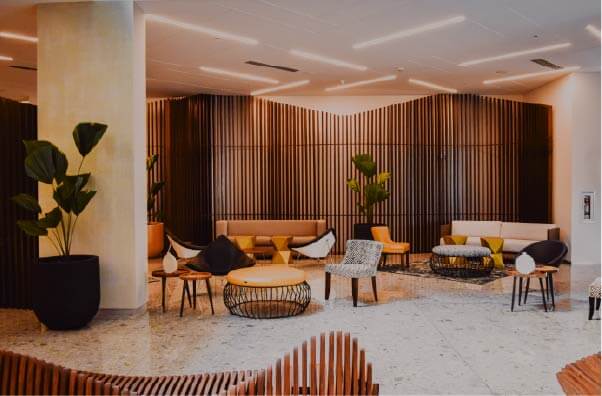In a digitally-driven world, having a technology-forward hotel is essential to manage and exceed guest expectations. Self-service technology is a great way to positively impact the hotel experience, allowing guests to take their hotel journey into their own hands, providing convenience and speed while enhancing the level of service, even during off hours.
In this article, we’ll look at this kind of technology and its effects on the hotel guest experience. Inevitably, the more solutions you have available at your hotel to tailor the guest’s experience, the higher the level of satisfaction and the more engaged they will be.
What is self-service technology?
Self-service technology is a type of technology that relies on a digital interface and/or Artificial Intelligence to allow customers to get help without any human interaction necessary. Applied to the hospitality sector, this means that hotels can engage their guests through the use of digital tools so that they are the ones in charge of their own experience.
Learn more about hotel engagement strategies.
The upside of this kind of tool is that it allows guests to complete tasks and request services without the need of a front desk or concierge staff to help them, thus reducing time-lapse between service requests, as well as making service more convenient and more accurate.
Effects of self-service technology on hotel guest experience
Self-service technology has an important effect on the hotel guest experience. Let’s take a look at some of its impacts.
Expedite service requests
While people tend to be more relaxed and patient while on vacation, it must be said that no one wants to wait on hold to place a request or get help resolving a problem. With self-service technology, guests can get service quicker by putting in a request via the virtual concierge, who immediately notifies the front desk or correct department to put that request in action.
This improves customer service and also frees up time for the front desk to take care of clients face-to-face. Faster service also boosts guest satisfaction, knowing that they can get what they want, when they want it.
Create a solid first impression
Check-in is one of the first interactions a guest will have with your hotel, so it should be a smooth and efficient process. Using technology like a kiosk to handle check-ins can create a solid first impression because it’s more efficient, and guests won’t have to wait in line. Your guests will value this hassle-free check-in process, helping them to form a positive opinion of your hotel from the get-go.
Put guests at ease
Post-pandemic, there has been a rise in the use of contactless technology in hotels in order to reduce physical interaction and help put guests at ease. Going contact-free is a good way to help guests feel safe, and make it so they only have to be in proximity with hotel staff if they choose to. This means they feel safe to travel no matter what.
Provide convenience
With self-service technology, you can provide your guests with convenience. This means that it no longer matters what time they check in or check out because they can use mobile check-in to check themselves in before they arrive. After a long flight, for instance, they can go directly to their room and with digital room keys they can unlock their rooms with their smartphones. This is incredibly convenient both for your guests and for your hotel because you don’t necessarily have to have someone on staff 24/7.
For guests wanting to order room service, the same mobile app they used for checking in can be used for digital ordering, meaning that they can order room service right from their bed without even having to lift the phone to make a call. There is nothing like easy and convenient service to boost guest satisfaction.
Create a smooth payment journey
With the use of technology you can set up a smooth payment process via a kiosk or online payments, allowing guests to manage their own payments with the payment option of their choice, whether that be PayPal or Apple Pay or a reward credit. Using digital payments, guests can pay how they want, when they want. The less friction and the smoother it is to carry out a transaction, the better the guest experience.
Find out why hotels should offer flexible payment options.
Autonomy
Self-service is one of the best techniques a hotel can use to boost guest satisfaction. With the right tools in place, guests can design and be in control of their own experience, choosing to check themselves in at any time of day, order room service from their smartphones, and request services without having to talk to anyone. They can choose the level of connection they want with staff and solve their own problems with the tools at hand.
Allowing customers to be autonomous is an important part of creating a good brand experience and making them feel like they have had a positive stay, largely because they are essentially in charge of their own experience. Of course, this goes along with having excellent customer service on hand should they need it.
24/7 support
Thanks to tools that allow guests to manage their own service requests, your hotel can offer 24/7 support without needing employees always on staff. Chatbots, virtual assistants, self check-in kiosks and other contactless devices work together to create a seamless interaction with your brand, allowing guests to be taken care of 24/7. Being able to handle their requests around the clock is just what you need to feel like the brand cares about them.
Conclusion
In this article, we’ve looked at the impact of self-service technology on the hotel guest experience. We’ve seen that it can contribute to making a more optimized, smooth and accessible customer journey. The more guests can take the experience into their own hands, the more engaged they will be in all aspects of the customer journey.
While the human factor is an important element of the hotel experience, applying these kinds of tools can expedite service and improve the overall guest satisfaction level, which can positively influence your hotel’s brand perception and help boost loyalty.
Written by

Eva Lacalle
Eva a plus d’une décennie d’expérience internationale dans le marketing, le marketing numérique, la communication et l’événementiel. Lorsqu’elle ne travaille pas, elle aime surfer, danser ou explorer le monde.









